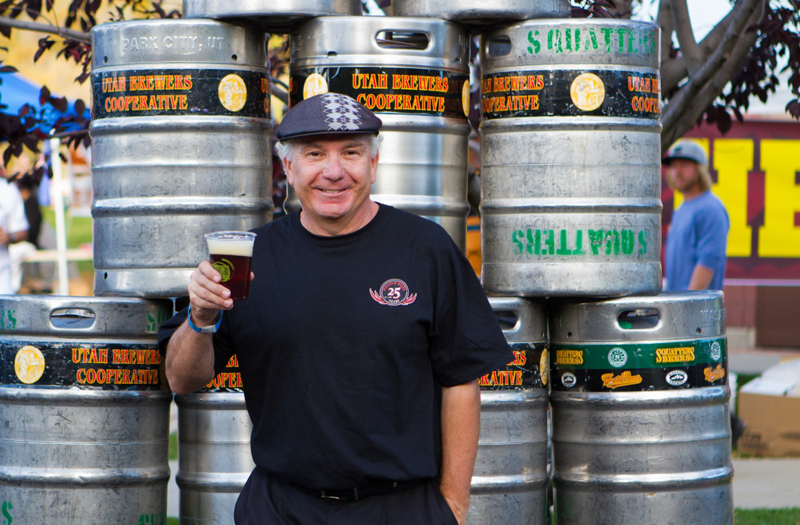Utah Brewers: How the Beehive State Got its Buzz Back

Greg Schirf (Courtesy of Utah Brewers Cooperative)
Greg Schirf’s mother dropped him at the side of the highway in Milwaukee so that he could hitchhike to Utah. It was 1974, and the recently minted Marquette University graduate, hair down to his waist, was unsure of what he wanted to do with his life. His older brother had gone to school out west, and had settled in a place called Park City, Utah.
Schirf would catch up with him. It was a 1,400-mile journey that would lead to Utah’s first new brewery in 19 years and its first small-batch, more traditional one since Prohibition.
He discovered a Park City far different than today’s. Many of the storefronts along Main Street were boarded up, the town still relatively undeveloped compared with the likes of Colorado’s Telluride and Aspen. Mining was the big industry around Park City then, skiing a boom-and-bust seasonal affair at best.
Schirf originally worked construction in Park City as well as in real estate development and brokerage with his brother. He started an alternative weekly newspaper with a friend, one aimed at the growing counterculture they represented. He realized he did not want to do real estate for the rest of his life, and he eventually sold his friend his stake in the newspaper.
Along the way, he took up homebrewing and began talking ceaselessly about launching a brewery. He had traveled to San Francisco in the early 1980s to see the Grateful Dead in concert, and visited the Anchor Brewing Co. while there. He’d also spent a year studying abroad in Rome while at Marquette, and that experience had whetted his appetite for the better beers and beer styles available in Europe.
The taste stayed with him.
Schirf incorporated the Schirf Brewing Co. with Utah in July 1982, and then not much happened until John Morse, an old college friend, invited Schirf to visit him in Seattle for Thanksgiving in 1984.
“You’re always talking about beer, and how you’re going to start a brewery,” Schirf recalled Morse saying to him.
In that case, Morse said, there was someone he wanted Schirf to meet. The someone was Tom Baune, who, along with his wife, had in 1984 launched the Hart Brewing Co. in Kalama, Washington, with a flagship pale ale called Pyramid.
Baune and Schirf hit it off, and Schirf hired Baune as a consultant on his brewery plan. He could not afford to pay him a regular fee, so he agreed to pay him a royalty on each barrel of beer Schirf sold. (As for Morse, he and his brother, who ran a frozen-foods company, would buy out Baune in the late 1980s with other investors and grow the reminted Pyramid brewery significantly.)
Schirf also consulted Ken Grossman at the barely 5-year-old Sierra Nevada Brewing Co., who helped him solve the puzzle of several stuck fermentations. It turned out that the ingredients were not getting sufficient oxygen because of Park City’s high altitude. Grossman suggested an oxygen tank for extra air.
That did the trick, and, soon, the Schirf Brewing Co. was off the ground—the first new brewery in Utah since Salt Lake City’s A. Fisher Brewing Co. shuttered in 1967.
Schirf Brewing started production on Oct. 24, 1986, in a warehouse at 1250 Iron Horse Drive, its first offering what Schirf called Wasatch Premium Ale, after the local mountain range.
Sales proved difficult in a state that the alcohol-averse Mormon Church dominated. To boost his numbers, Schirf decided to open a brewpub in Park City, one that might cater to the increasing number of skiers coming through and that would cut down on distribution costs. He had explored the phenomenon firsthand in Northern California, but he soon ran into a problem familiar to other craft brewing pioneers: Brewpubs were illegal in the Beehive State.
Schirf, with the aid of a sympathetic state legislator, would have to change the law before he could open the brewpub. This he and the legislator did, and in 1989 Schirf opened Utah’s first brewpub on Park City’s Main Street. A copper brewing kettle loomed from a window overlooking the once-blighted drag.
Schirf Brewing in 2000 formed the Utah Brewers Cooperative with fellow Utah concern Squatters Craft Beers. Boston-area private equity group Fireman Capital later acquired control of the cooperative; and Schirf, the man, retired in 2015, just under 30 years after bringing brewing back to Utah.
Read more Acitelli on History posts.
Tom Acitelli is the author of The Audacity of Hops: The History of America’s Craft Beer Revolution. His most recent book is a history of American fine wine called American Wine: A Coming-of-Age Story. Reach him on Twitter @tomacitelli.

Leave a Reply